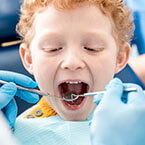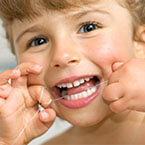Children's Teeth: Development, Prevention & Problems

Table of Contents
When Do Baby Teeth Come In?
Children’s teeth begin forming before birth. The first primary, or baby, teeth erupt through the gums as early as four months. All 20 of the primary teeth usually appear by age three, although their pace and order of eruption varies. Permanent teeth begin appearing around age six. This process will continue until approximately age 21.
Preventative Measures for Good Oral Care
To help ensure oral health and a lifetime of good oral care habits, follow these key preventative measures:
- Limit sugar intake to help prevent tooth decay.
- Make sure children get enough fluoride, either through drinking water or as a treatment at the dentist’s office, to strengthen tooth enamel and resist decay. This may include fluoride supplements in areas where drinking water is not optimally fluoridated. Be sure to ask your dentist about supplements to determine if they are needed.
- Consider dental sealants. Dental sealants provide a further layer of protection against cavities. They’re made of plastic and are bonded to the teeth by the dental team.
- Teach kids to brush and floss regularly and properly. Try creating ways to make brushing and flossing fun for your child in order to encourage a good oral health routine.
Baby Teeth Problems
Here is an outline of some common challenges when it comes to kids' oral health.
- Baby bottle tooth decay: To avoid this common problem, wipe gums with gauze or a clean washcloth and water after feeding. When teeth appear, brush daily with a pea-sized amount of fluoride toothpaste. Also remember to put the child to bed with a bottle of water instead of milk or juice.
- Thumb sucking: The catchall term for the various oral sucking habits of children is “non-nutritive sucking.” This includes thumb or finger sucking and the use of pacifiers. Most contemporary pediatric health providers agree that these habits have important formative and nurturing functions and, at least for the first few years of life (up until about age four), should be ignored. There is, however, universal agreement that sucking should cease before permanent teeth begin to appear. Consult your dentist on your child’s sucking habits.
- White spots on teeth: As soon as the first tooth appears, usually at about six months, begin cleaning your child’s teeth daily and schedule a dental appointment.
Toddler Oral Care Problems
- Fear of the dentist: Allow the child to sit in a parent’s lap during the exam to make them feel more comfortable.
- Difficulty creating an oral care routine: Try involving the whole family, and be a role model. For example, brush together at the same time each day to start creating a good habit.
- Stains from antibiotics: Speak to the pediatrician before any medication is prescribed.
Grade-schoolers Oral Care Problems
- Love of sweets: Try to give your children healthy snack options like vegetables, yogurt or cheese.
- Stains from antibiotics: Speak to the pediatrician before any medication is prescribed.
- Oral injuries from sports: Encourage children to wear mouth guards during sports to protect their teeth from any potential accidents.
Teenagers Oral Care Problems
- Braces: Make sure that teens brush well around braces and use a floss threader to remove all food particles.
Table of Contents
- When Do Baby Teeth Come In?
- Preventative Measures for Good Oral Care
- Baby Teeth Problems
- Toddler Oral Care Problems
- Grade-schoolers Oral Care Problems
- Teenagers Oral Care Problems
-
- Related Articles

Sign Up
for expert advice and exclusive offers

Sign Up
for expert advice and exclusive offers





